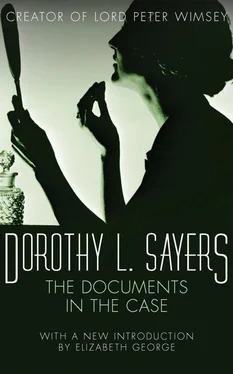Dorothy Sayers - The Documents in the Case
Здесь есть возможность читать онлайн «Dorothy Sayers - The Documents in the Case» весь текст электронной книги совершенно бесплатно (целиком полную версию без сокращений). В некоторых случаях можно слушать аудио, скачать через торрент в формате fb2 и присутствует краткое содержание. Жанр: Классический детектив, на английском языке. Описание произведения, (предисловие) а так же отзывы посетителей доступны на портале библиотеки ЛибКат.
- Название:The Documents in the Case
- Автор:
- Жанр:
- Год:неизвестен
- ISBN:нет данных
- Рейтинг книги:5 / 5. Голосов: 1
-
Избранное:Добавить в избранное
- Отзывы:
-
Ваша оценка:
- 100
- 1
- 2
- 3
- 4
- 5
The Documents in the Case: краткое содержание, описание и аннотация
Предлагаем к чтению аннотацию, описание, краткое содержание или предисловие (зависит от того, что написал сам автор книги «The Documents in the Case»). Если вы не нашли необходимую информацию о книге — напишите в комментариях, мы постараемся отыскать её.
The Documents in the Case — читать онлайн бесплатно полную книгу (весь текст) целиком
Ниже представлен текст книги, разбитый по страницам. Система сохранения места последней прочитанной страницы, позволяет с удобством читать онлайн бесплатно книгу «The Documents in the Case», без необходимости каждый раз заново искать на чём Вы остановились. Поставьте закладку, и сможете в любой момент перейти на страницу, на которой закончили чтение.
Интервал:
Закладка:
I was very glad to hear that your work was progressing so well and that your action in the matter of the man you dismissed was approved of. Leniency in such a case is always a mistake, as I have found out from bitter experience.
We are doing better over here than we had really any right to expect under the present depressed conditions. I think we shall secure the contract for the Middleshire High-Power Station. If so, that will mean a big job, which will probably take me away from London in the spring.
I am really wondering whether, before this happens, I ought not to take some steps about replacing Miss Milsom by somebody who would be a more suitable companion for Margaret. Miss Milsom has always seemed to me a very tiresome woman, and lately she has been getting altogether above herself. She consults these psycho-analytical quacks, who encourage her to attach an absurd importance to her whims and feelings, and to talk openly at the dinner-table about things which, in my (doubtless old-fashioned) opinion, ought only to be mentioned to doctors. Besides, she is very lazy and untidy, and, instead of putting her mind to the housework, she litters the place with wool and bits of paper which she calls ‘art materials’ and she borrows my paints and forgets to return them. There is no harm, of course, in her doing needlework and making calendars, if it does not interfere with her duties, but she has frequently been very impertinent when I have had occasion to speak about the unsatisfactory cooking. Lathom has been painting a picture of her — a very clever thing, certainly, but it seems to have turned her head completely. However, Margaret wishes to be kind to the woman, and says, truly, that she would find it hard to get another post, so perhaps it will be better to put up with her a little longer and see if the situation improves. She is certainly most loyal and devoted to Margaret, and that outweighs a great many drawbacks.
Well, I must not worry you with these small domestic matters. I hope that you will be enjoying a very happy Christmas in your exile, and that our little offerings have arrived quite safely. By the way, your plum-pudding was not, I can assure you, an example of Miss Milson’s culinary genius. I attended to that important matter myself — otherwise you might have found many strange things in it — such as glass beads or stencil-brushes! The calendar, however, was all the lady’s own work. She wonders regularly every day whether you will like it, and whether your colleagues will think it was painted for you by your fiancée. She means kindly, poor woman, so, if you have not already expressed your hearty delight, pray do so, and assure her that the masterpiece has an honoured place on your walls.With much love, Your affectionateDad
25. Note by Paul Harrison
I can find only one letter for the next few weeks with any important bearing on the subject of this inquiry. My father and stepmother were in Paris from the 15th of December to the 7th of January. I received a few picture postcards with accounts of places visited, but they contained nothing of any moment, and I did not preserve them.
Lathom joined them on or about the 28th of December, and spent the Jour de l’An in their company. I believe that Mrs Harrison wrote several letters to Miss Milsom from Paris, but these I have been unable to secure; in fact, I am informed that they have been destroyed. I visited Miss Milsom (see my statement No. 49), and questioned her as tactfully as possible on the subject, but could only get from her a rambling diatribe, full of the same demented prejudice she has always displayed against my father, and, in the absence of any direct evidence (such as the original letters would have afforded), I feel bound to ignore her remarks. Indeed, it is obvious that nothing which Miss Milsom says later than April, 1929, is of any evidential value whatsoever, and that all her statements, without exception, must be received with extreme caution, except in so far as they tend to prove the influence exerted, consciously or unconsciously, by her upon my stepmother.
Mr Munting, who spent the Christmas season with his family and in the company of his fiancée, not returning to town till the 15th of January, has handed to me the only letter which he received from his friend during this period.
26. Harwood Lathom to John Munting
Polperro 4th Jan., ’29
Dear Munting,
How are you? And how did the season of over-feeding and Christian heartiness leave your soul? Did honourable love survive the domesticities? If so, I swear that you and your intelligent young woman are either gods or beasts. Gods, probably — with that dreadful temperateness of the knowledge of good and evil, seeing two sides to every question. You will analyse your bridal raptures if you have any, and find the whole subject very interesting. You will have, Heaven help you! a sense of humour about the business, and your friends will say how beautiful it is to see such a fine sense of partnership between a man and woman. A copulation of politic tape-worms! But where is the use of being offensive to a man who will allow for my point of view? I hate being allowed for, as if I were an incalculable quantity in an astronomical equation.
Having (thank God!) no family, except my aunt at Colchester, I escaped good King Wenceslas and departed for Paris, where everything is jejune enough, and the weather just as snow-bound and bitter as our own happy island, but where at least the stranger is not sucked into the vie familiale . I found the Harrisons dismally vegetating in a highly respectable Anglophile hotel, and toted them round the usual stale shows, getting my pleasure from their naïve enjoyment. Or, at any rate, from her enjoyment; the old boy was as peevish as ever, and brought the blush of shame to my cosmopolitan cheek by walking out of a cabaret in the middle, trailing his wife and friend after him in the approved barn-door style. Being too wrathful for speech, I said nothing, and had the pleasure of sitting out a family row in the taxi afterwards. La belle Marguerite was actually quite as shocked as he was, poor child, but thrilled to an unregenerate ecstasy nevertheless. She has the makings of a decent pagan soul if one could teach her. However, I needed to do no teaching. His vulgar disgust (with which, if he had had the elementary tact to leave her alone, she would have agreed) drove her into an excited opposition, and she argued the point with an obstinacy and wholeheartedness which it was a pleasure to listen to. I wouldn’t be appealed to — I didn’t want a row, and besides she will learn nothing except by arguing it out for herself. In fact, I apologised and said, in effect, that an artist became rather blind to the properties, legs, as the bus-conductor said, being no treat to him. In fact, I controlled myself marvellously, and — went away and walked about in a fury all night!
After that we did picture-galleries, and I had to listen to Harrison’s lectures on art. Never have I heard — not even in Chelsea — so much jargon applied over so grisly a substructure of ignorance and bad taste. The man ought to be crucified in the middle of all his own abominable daubs. You would have enjoyed it, I suppose, or made copy of it.
We saw the New Year in with dancing and the usual imbecile festivities. Mrs H. thanked me with tears of excitement in her eyes — it was pathetic — like giving sweets to a kid. Even H. was a little moved from his usual grimth. I procured him a partner — no! I didn’t hire her, I knew her — a decent little soul who used to live with Mathieu Vigor and is now, I believe, Kropotzki’s petite amie — and she trundled him round in the most amiable way. He emerged from the fray quite sparkling (for him!), and solemnly led Madame out for the next dance! That didn’t go so well, because he found fault with her steps, so I pushed him back on to Fleurette, who could dance with a kangaroo, I think, clever little devil.
Читать дальшеИнтервал:
Закладка:
Похожие книги на «The Documents in the Case»
Представляем Вашему вниманию похожие книги на «The Documents in the Case» списком для выбора. Мы отобрали схожую по названию и смыслу литературу в надежде предоставить читателям больше вариантов отыскать новые, интересные, ещё непрочитанные произведения.
Обсуждение, отзывы о книге «The Documents in the Case» и просто собственные мнения читателей. Оставьте ваши комментарии, напишите, что Вы думаете о произведении, его смысле или главных героях. Укажите что конкретно понравилось, а что нет, и почему Вы так считаете.












